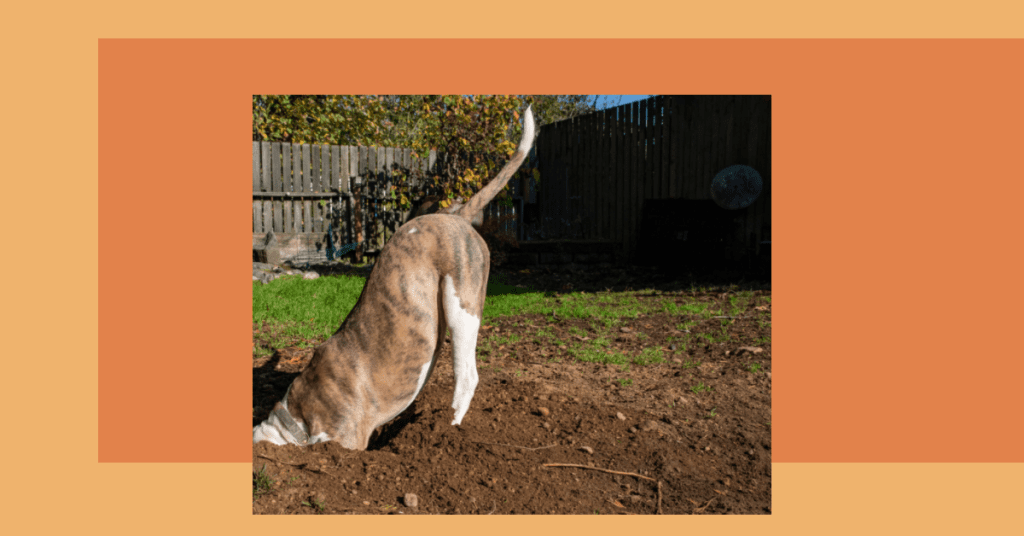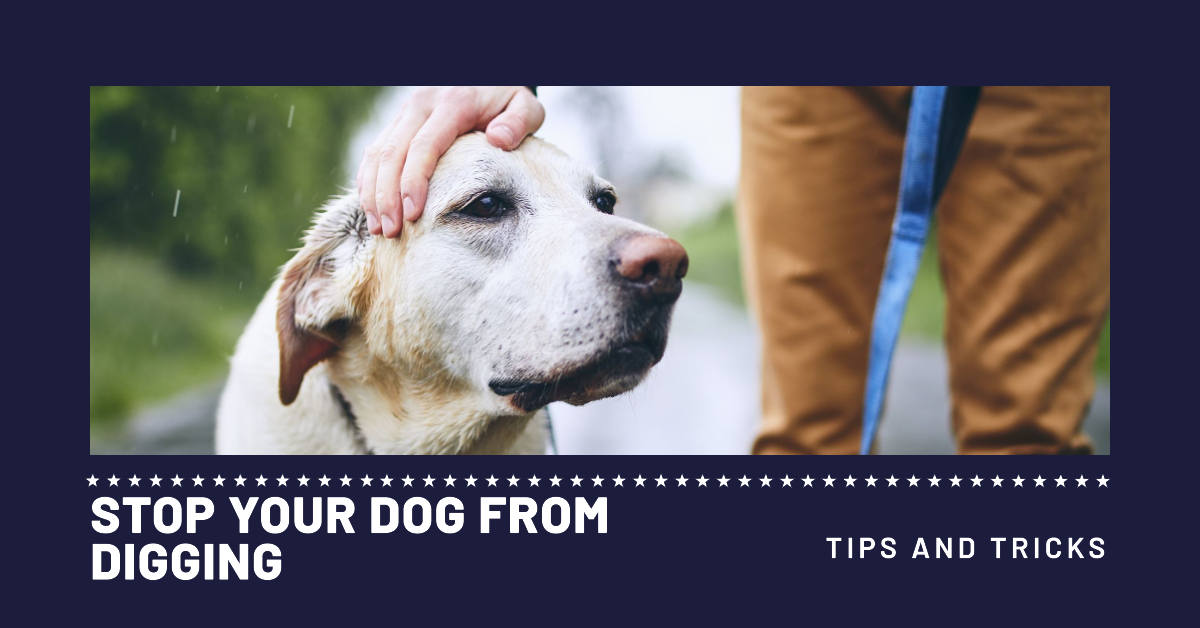Digging up your yard? Frustrating, right? But don't worry – there are ways to stop it!
If you're a dog owner, then you understand the struggle of having a dog that just loves to dig up your yard. Perhaps they are born with a natural inclination to explore, or maybe they're bored and looking for something to do. Regardless of the reason, it can be frustrating seeing all your hard landscaping work undone in a matter of seconds.
Luckily, there are several ways to stop your dog from digging up your yard. In this article, we'll share some tips and tricks on How To Stop A Dog From Digging to prevent your dog from turning your beautiful garden into a battlefield.
As an Amazon Associate, we earn from qualifying purchases
Understanding why dogs dig holes
There are several reasons why many dogs may dig up your yard. Some dogs dig out of boredom, to escape from their enclosed area, to hunt prey, to cool down when it's hot outside, or because they have a natural instinct to dig. Other reasons why dogs dig include being left alone for long periods, separation anxiety, lack of exercise, underlying medical conditions, poor diet, and lack of mental stimulation.
To stop your dog from digging, first, identify the cause.
Certain breeds, like Dachshunds, have an affinity for digging to escape due to instinctive behaviors passed down from ancient times. Try these tips and tricks plus additional steps tailored to your dog's needs to create a happy, harmonious relationship – and fewer holes in your yard!
Ways to Stop a Dog from Digging


There are many ways how to stop a dog from digging up your yard. Some methods you can try include creating a designated digging zone, providing plenty of exercises and mental stimulation, using deterrents like chicken wire or rocks, and offering dog toys to redirect their digging behavior.
You can also try training your dog not to dig, supervising them when they are outside, using positive reinforcement to reward good behavior, burying their waste in the areas they like to dig, and giving them a comfortable dog house or shaded area to cool down in.
Using positive reinforcement training techniques
Dogs love to dig– it can make your yard a mess! But you can teach them to stop with positive reinforcement. Figure out why they're digging, and address the root cause, not just punish them.
Be consistent and patient with your training
It takes time and effort, but it's worth it. Reward-based training builds a better relationship between you and your pup. Different techniques may work for different dogs. So, don't be afraid to get help if needed.
Make your yard a peaceful place to enjoy with your pet. Use these positive reinforcement tips and watch your pup progress!
- Give your dog treats and kind words when your dog stops digging in areas it shouldn't.
- Make designated spots for your dog to dig, and give rewards when they use these areas.
- Try positive reinforcement techniques, such as clicker or target training, to promote good behavior.
- Enroll your dog in obedience classes or get a professional trainer to help you reward ideal behaviors effectively.
To restrict certain areas from often digging, use physical barriers like garden fencing. Pet-friendly sprays like citronella or bitter apple can also be helpful.
Ignoring or redirecting unwanted behaviors
Train your pet to stop digging by disregarding or redirecting undesired behaviors. Acknowledge their urge to dig and direct it in a more appropriate way.
- Allocate a specific area for them to dig.
- Reward them for good behavior.
- Do not punish or shout at them if you catch your dog digging.
- Remove the source of attraction if digging is linked to prey drive.
- Scatter chicken wire or rocks in the problematic spots to discourage digging.
- Monitor your pup while outdoors and instantly correct any dig attempts.
Understand that every pup has its own reason for digging. So, divert their attention to other constructive activities.
Indoor activities
Introduce interesting indoor activities such as hide-and-seek or teach them new tricks to keep them mentally engaged. The American Kennel Club states that some breeds, such as Dachshunds and Terriers, have a higher inclination for tunnel excavation activities. Be aware of these special traits to properly train them and address their breed-specific tendencies in an effective manner.
Providing mental and physical stimulation
Dogs have this instinctive habit of digging, which can be quite annoying for owners. To help redirect dogs from digging holes in the yard, provide physical and mental stimulation.
- Take your pup out for regular walks.
- Start obedience training or agility courses.
- Give them interactive toys and puzzles.
- Set up playdates with other dogs.
- Create a designated digging area with sand or dirt.
- Hire a professional dog trainer if need be.
Also, reward good behavior. If you catch your pup digging in undesired places, guide their focus to something appropriate.
Remember: Every dog is different and may respond differently to various forms of stimulation.
To find the best method, experiment with different techniques. And don't forget the puzzle toys; they're great for keeping your pup's paws occupied!
Offering interactive toys and puzzles
Interactive toys and puzzles are a great way to distract your dog from digging. They provide mental stimulation and release pent-up energy which could lead to destructive behavior. Puzzles also keep your pup engaged and entertained! Rotate their selection of puzzle toys every few days or weeks to keep things interesting. You could also fill the toy with treats – this will make them even more eager to play!
Training your pup is like going to the gym – you'll hate it at the moment, but you'll love the results.
Engaging in regular exercise and training
Exercising and training your canine companion is key to curbing their digging habits. Here's how:
- Take them on a daily walk. A 30-minute stroll will keep them mentally stimulated and reduce any boredom or anxiety that can lead to digging.
- Play fetch with them in a controlled environment. This interactive game will build your relationship and provide mental stimulation.
- Teach basic commands like ‘stop,' ‘sit,' and ‘stay.' This will build discipline and reinforce positive behavior.
- Create an obstacle course. This exercise boosts physical strength, agility, and balance, plus provides a fun environment for your pet.
- Hire a professional trainer if your dog is still digging. If your dog has a deep-rooted issue, an expert can help.
Exercise and mental stimulation are essential for dogs. It can help keep them physically and behaviorally healthy while discouraging destructive behaviors like digging.
Did you know that certain breeds were originally bred for specific tasks? For example, Golden Retrievers have a strong sense of smell and were initially trained as hunters.
Exercise and training go hand in paw to provide our furry friends with the right amount of stimulation to maintain their breed-specific instincts.
Instead of ruining your garden, why not give your pup its own sandbox – after all, it's easier to clean up the sand than mud!
Creating a designated digging area
Dogs have a natural urge to dig. To stop them from mischievous digging, create a designated area. Here's how:
- Pick a spot with good drainage and shade.
- Outline the area with bricks or garden edging.
- Prep the area – remove grass and debris and loosen up the soil.
- Add sand or topsoil for better drainage. Make it 2-3 inches deep.
- Place toys, bones, and treats in the pit only.
- When your dog starts to dig elsewhere, lead them to the designated spot.
Educating your pooch about the boundaries of their spot is important. Also, let them take breaks away from the area.
Set up a dig zone in the yard for your pup and let them have fun without causing destruction.
Using a sandbox or specific spot in the yard
To stop your dog from digging up your entire garden and making it full of holes, try using a sandbox or a specific spot in the yard. Here's a 6-step guide:
- Select a location in your garden where your dog can dig without causing damage.
- Bring your dog over and let them explore the area. Encourage them to test out the sand or soil with their paws.
- While they're using the area, supervise and redirect them if they try to dig elsewhere.
- Make the spot more enticing by adding toys and treats.
- Encourage your dog consistent use of the designated area so it becomes part of their routine.
- Clean out debris regularly to keep it inviting.
Remember that each dog is different and may need different methods. Bury toys or bones in the designated area for extra motivation.
I know from experience – my Labrador used to dig holes all around the garden. I tried rocks and scolding, but nothing worked until I gave her a sandpit. Then she only ever dug in that one spot, and my garden stayed perfect! Make sure to use treats or buried treasure to motivate your pup!
Encouraging the use of treats and rewards
Our dogs love to dig, and it can be a real issue. But there's hope! Treats and rewards can help. Here's how:
- Positive reinforcement. Give treats or praise when your dog doesn't dig. This rewards good behavior.
- Mix up the treats. Use different ones each time to make it interesting.
- Have fun. Try games, like hiding rewards, to encourage focus.
Remember: Positive feedback is better than negative criticism. Some breeds are more dig-prone than others, like my Labrador. We rewarded him every time he avoided digging or went to his designated spot. Now, we can admire his composed nature instead of looking at holes in our lawn!
Organic warfare is the way to go – use natural deterrents to stop your dog from digging.
Using natural deterrents
To prevent your dog from digging in your yard, using natural deterrents is a great solution. In this section, we will explore some effective options that you can use to deter your dog from digging. These include using citrus or vinegar sprays, planting lavender or rosemary, and using physical barriers such as rocks or chicken wire to keep your dog from digging in unwanted areas.
Using citrus or vinegar sprays
If you’re tired of your dog digging up your garden or chewing on plants, citrus or vinegar sprays can help. Dogs typically avoid these smells and find them unpleasant.
To use this method, mix equal parts water and either fresh-squeezed citrus juice or white vinegar in a spray bottle. Shake well and spray the mixture over the areas you want your dog to avoid. Be sure to reapply after rain or watering plants. This method is safe for plants and will not harm your dog.
Additionally, it’s an affordable and easy solution to help protect your garden. Keep in mind, however, that this is not a foolproof method, and your dog may continue to dig or chew despite the spray. It’s important to also provide your dog with appropriate toys and chew items to redirect their behavior.
Using plants such as lavender or rosemary
Lavender and rosemary can be used as natural dog deterrents! These plants not only keep bugs away but also add beauty and fragrance to your garden. Here are a few ways you can use them:
- Plant them around the perimeter of your property for a barrier against dogs.
- Mix lavender and mint leaves in a spray solution or sachet for a stronger dog repellent.
Create a fortress of plants and fragrances! Natural dog deterrents are the ultimate DIY home defense. Start using them in your garden today!
Using physical barriers like rocks or chicken wire
Physical barriers such as rocks and chicken wire can be great! Here are 5 points to think about:
- Choose rocks of the right size and shape to make an obstacle.
- Line the perimeter with chicken wire and make it tall enough to stop climbers.
- Arrange rocks randomly, not neatly.
- Check for any weak spots and fill them in.
- If deer are a problem, use electric fencing instead.
Sometimes physical barriers won't work. Intruders can figure out ways around them. Plus, they can look bad. But they can be cheaper than other security solutions.
My friend recently added boulders to her garden beds to keep dogs away. It worked and it looked great! Physical barriers like rocks or chicken wire can be effective if you use them right and make them look nice. If natural deterrents don't do the job, it's time to get commercial repellents. Fight fire with chemicals!
Using commercial repellents
To stop your dog from digging, it's worth considering using commercial repellents such as bitter apple spray or motion-activated sprinklers. These can be effective solutions for preventing your dog from digging up your yard. It's important to research these products beforehand, however, to ensure that they are safe and effective for use with your dog.
Considering options such as bitter apple spray or motion-activated sprinklers
When it comes to pesky dogs, commercial repellants such as bitter apple spray and motion-activated sprinklers can be great options. Here are five points to remember when using these:
- Bitter apple sprays can be sprayed on favorite digging and other surfaces to stop dogs from nibbling or chewing. It creates a bad taste in their mouth, so they won't do it again.
- Motion-activated sprinklers sense movement and spurt water at the intruder, scaring them away. These work best during the night when critters are more active.
- The repellents may need to be reapplied after rain or heavy watering.
- Don't rely on just one repellent. Fencing or netting may be needed too.
- Always read and follow the instructions for any repellent.
Finding a safe and effective commercial repellent can be tricky, but with the right approach, you can get your dog to leave the digging problem!
Researching products to ensure safety and effectiveness
When it comes to repellents, it's essential to research products. Learn about active ingredients and any potential side effects. Look for products tested by organizations like the EPA or CDC. Check customer reviews before making a purchase.
No repellent is 100% effective. Follow instructions and reapply as needed. Natural remedies may seem appealing, but they often lack rigorous testing.
Summary and conclusion.
Dogs love to dig, which can be destructive. There are a few strategies how to stop a dog from digging:
- Exercise and mental stimulation can reduce boredom and curb the need for digging.
- Designate areas with sand or mulch.
- Use dog-specific repellents, such as citrus or vinegar, or buy natural detergents.
Plus, reward good behavior and discourage bad behavior with firm commands and corrections. Every dog is different; be patient and consistent when teaching them.
Check your yard for potential hazards that might encourage your pet to dig. Secure fencing to avoid escapes or dangers.
These methods, plus patience, consistency, and anticipating problem areas, will maintain a pleasant relationship between you and your furry pal. Enjoy a beautiful lawn and a happy home life!
Frequently Asked Questions – How To Stop A Dog From Digging Up The Yard
What can I use to stop my dog from digging?
There are several options available such as dog digging repellents, natural deterrents, covering the digging spot with physical barriers, or providing a designated digging area.
How do I make my dog stop digging?
Start by identifying the reason why your dog is digging. If it's due to boredom or lack of exercise, provide more physical and mental stimulation. Use positive reinforcement to encourage good behavior and redirect their attention to a more appropriate activity.
What is the best dog-digging repellent?
There are many commercial dogs digging repellents available, but most contain harmful chemicals. A natural alternative is to use citrus or vinegar sprays. Planting spiky plants or sprinkling cayenne pepper around the area can also be effective.
How can I get my dog to stop digging?
Consistency is key. Keep an eye on your dog and interrupt the digging behavior with a simple, firm “no” command. Redirect their attention to a more appropriate activity like playing fetch or going for a walk. Be patient and consistent with positive reinforcement.
What is a natural dog-digging deterrent?
Some natural deterrents include coffee grounds, citrus oils, or vinegar. Sprinkle or spray these around the digging area to discourage your dog from digging. You can also plant prickly plants or make a designated digging spot for your dog.
Can I use a shock collar for digging?
No, using a shock collar for digging is not a humane or effective solution. It can cause severe physical and psychological harm to your dog. Positive reinforcement and finding the underlying cause of the behavior is a more effective and humane solution.





